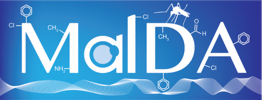Covalent Plasmodium falciparum-selective proteasome inhibitors exhibit a low propensity for generating resistance in vitro and synergize with multiple antimalarial agents.
Journal:
PLoS pathogens, Volume: 15, Issue: 6Abstract:
Therapeutics with novel modes of action and a low risk of generating resistance are urgently needed to combat drug-resistant Plasmodium falciparum malaria. Here, we report that the peptide vinyl sulfones WLL-vs (WLL) and WLW-vs (WLW), highly selective covalent inhibitors of the P. falciparum proteasome, potently eliminate genetically diverse parasites, including K13-mutant, artemisinin-resistant lines, and are particularly active against ring-stage parasites. Selection studies reveal that parasites do not readily acquire resistance to WLL or WLW and that mutations in the β2, β5 or β6 subunits of the 20S proteasome core particle or in components of the 19S proteasome regulatory particle yield only
